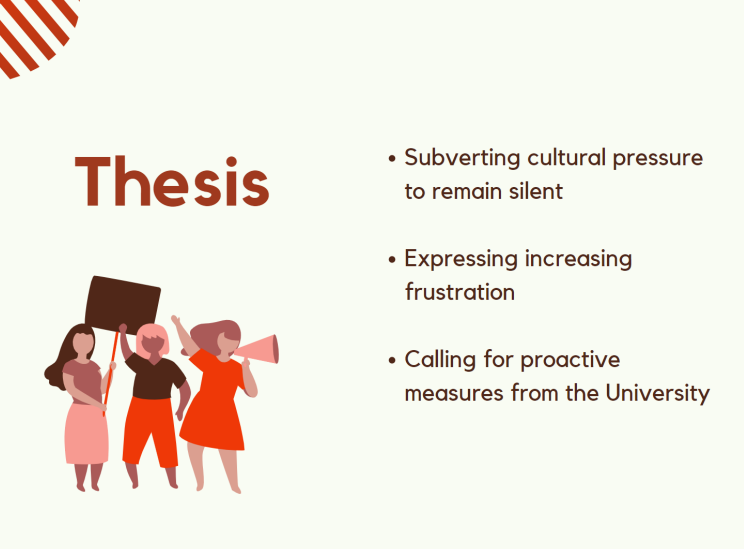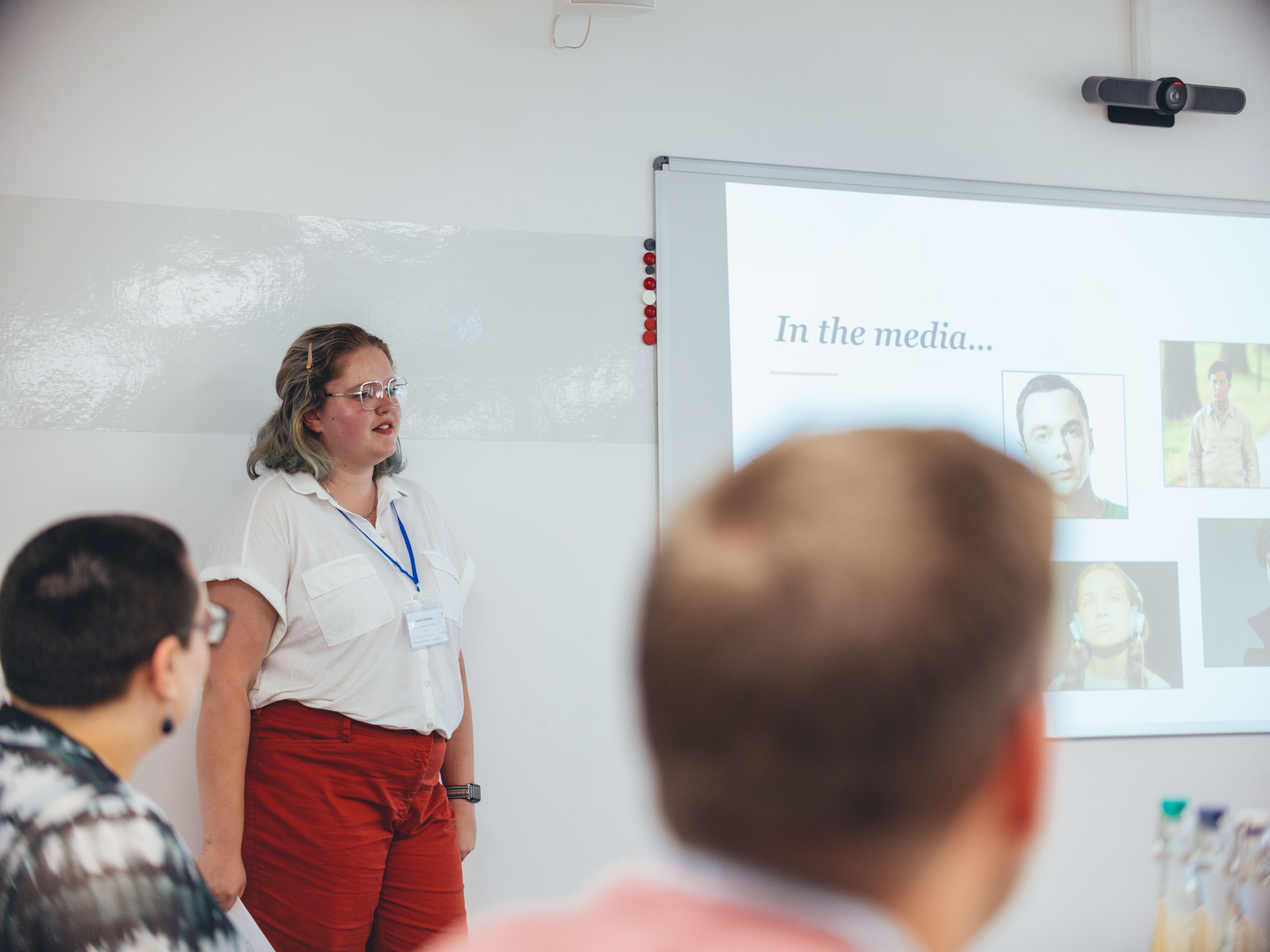GSD students drive discussions at Warwick Inclusion Conference

Above: Photo by Henri Calderon, from Sophie Kitching's session on 'Inclusive teaching for autistic and neurodivergent students' at the Warwick Inclusion Conference.
On 16 June 2022, staff from across the University were invited to attend Warwick's inaugural Inclusion Conference. The event celebrated diversity and offered an inclusive environment in which colleagues could learn, collaborate, and co-create. Participants shared practice, generated ideas, thought deeply about what it means to be an inclusive institution, and celebrated the University's collective achievements and progress so far.
Two of our undergraduate Single Honours GSD students, Naomi Carter and Sophie Kitching, presented at the conference on the important topics of combatting menstrual stigma to enhance wellbeing and inclusive teaching for autistic and neurodivergent students. We spoke with Naomi and Sophie about their work and their experiences of the conference.
Naomi Carter
Hi Naomi, can you tell us about your role as the co-Women’s Officer at the Student's Union?
"I was elected as the co-Women’s Officer in February 2021 with Politics and International Studies (PAIS) student Eman, where we made combatting period poverty a key part of our campaign. Once in office, I took the lead on the #EndPeriodPoverty campaign – this meant contacting other universities that had similar initiatives, applying to the SU Environment and Sustainability Fund, contacting sustainable and period positive brands, ordering products from the company Here We Flo (a period-positive, black-owned business that donates 5% of profits to combatting period poverty and FGM), and dispensing them with the help of my #EndPeriodPoverty working group of volunteers.
[TW – sensitive gendered topics] Other work has included working with the SU, through an All Student Vote, on a drink spiking action plan, beginning discussions about securing a women’s and non-binary only gym space or time, and continuing previous discussions with various student and University groups about tackling sexual assault on campus."
What did your research project focus on as part of the Inequalities module? What can the University learn from this work?

"This project investigated student perceptions of the ongoing stigma surrounding menstruation at the University of Warwick and their ideas for potential interventions. I conducted a focus group of six menstruating students at Warwick, to suggest that students are increasingly countering pressure to remain silent about menstruation, instead expressing frustration with the lack of institutional support for menstruators.
The key takeaway for the University was the need for proactive measures to counter menstrual stigma and period poverty, including improved menstrual education, widespread product provision, and practical interventions like flexible deadlines or exam arrangements for menstruating students. These interventions and public acknowledgement and discussion of menstruation are needed to help menstruators mitigate the impact of pain and menstrual management on their wellbeing and academic performance."
What were the key takeaways from your presentation at the Warwick Inclusion Conference?
"It’s hard to sum up something so full of content, however, these are the main points I wanted to highlight to the audience:
- The #EndPeriodPoverty campaign launched by myself as SU Women's Officer has had its successes and fills an important gap in provision, but still faces barriers regarding its measurability and sustainability - ideas regarding maintaining this campaign and securing consistent funding is always welcome!
- Research into student experiences of menstrual stigma at the University of Warwick demonstrates that students are increasingly subverting cultural pressure to remain silent about menstruation, instead expressing frustration at a lack of education and support.
- However, this ability to express frustration remains limited to privileged groups, and the experiences of marginalised students must be centred.
- Students call for proactive measures from the University to better support and educate menstruating students, which should be enacted and facilitated at different levels.
- There is potential for much greater collaboration between staff and students on this topic, recognising the shared experiences of different menstruators within the University."
What was your experience of presenting at the conference?
"My session was such a positive experience, and I really felt that the audience was supportive of the #EndPeriodPoverty initiative, being keen to sustain and expand research and interventions to support menstruating students. The audience and their questions highlighted the particular impact that period poverty and menstrual stigma have on marginalised students (such as trans, culturally diverse, disabled, and international), which is something I would like to take forward when expanding the campaign and continuing my research.
I was surprised to feel more confident than I had expected, helped by the fact that I am really passionate about this work and had given a similar presentation for the Inequalities module a few days before."
What inspired you about the other sessions you attended at the conference?
"I think the audience inspired me because they challenged the presenters to think more widely beyond their presentations to really dig deep into what inclusion can actually mean and look like, for different groups. I took away a greater understanding of the initiatives and momentum for equality that exists amongst university staff, although also a greater drive to discuss what inclusion and equality can actually mean, as there were still some parts of the conference that made me question who had designed it, in what way, and with consulting what groups."
Why is it important for students to be part of the conversation about what it means to be an inclusive institution?
"It’s literally impossible for an institution to claim it is inclusive without including those that make up the majority of its body, and those that it is there to serve, uplift and educate – including staff and students alike. Inclusion looks like everybody having an equal opportunity to participate in knowledge creation, policy making, idea generation, etc., and that means having both the opportunity to be physically present (e.g. by inviting students to present at the Warwick Inclusion Conference), and the opportunity to be mentally present and at ease (e.g. by addressing hidden power dynamics that may render students uncomfortable or unable to speak up)."
Do you have any plans for future projects related to inclusive education?
"I have nothing concrete yet – I will be going on a year abroad to Sweden, so I am curious to see if the Scandi reputation of equality and opportunity plays out in the real-life dynamics that I observe! In my final year, I hope to run for Women’s Officer again and continue this branch of research in my dissertation."
Naomi's presentation was part of Session 4 of the Warwick Inclusion Conference.

